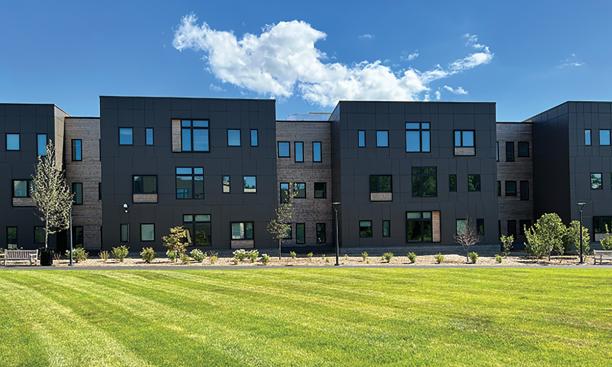
In December 2021, President Christopher Eisgruber ’83 and a dozen Princeton administrators and local officials placed their shovels in the dirt for a ceremonial groundbreaking at the Meadows Neighborhood (then known as the Lake Campus), extending the University across Lake Carnegie and into the township of West Windsor.
Three years later, the development near Washington Road is taking shape, with housing for graduate students and postdocs now partly occupied, an underground geo-exchange system in place to heat and cool buildings, and several athletics facilities expected to be available in the fall semester.
“The Meadows Neighborhood will provide a place that is experienced as a natural, yet distinctive extension of the existing campus,” Dozie Ibeh, associate vice president for capital projects in the Department of Facilities, told PAW via email. The housing complex includes a community garden, barbeque areas, and outdoor recreation spaces for volleyball and table tennis, along with community rooms and a retail café slated to open this summer.
The 379 housing units opened in April and are expected to be filled by the start of the fall semester. The complex “significantly increases” the number of one-bedroom and studio apartments for grad students and postdocs, which are the most requested types, according to Dorian Johnson, executive director of housing and real estate services. Multi-occupant units include private bathrooms, Johnson added, for residents who want more cost-effective options. Parking is available in a nearby garage; shuttle bus routes, sidewalks, and bike lanes connect the Meadows Neighborhood to the main campus.
Graduate housing is in high demand, Johnson said, and the addition of the Meadows complex has “greatly increased the number of students the University can house on an annual basis.” Princeton guarantees University housing for new graduate students who request it before the housing application deadline.
The West Windsor land is also expected to be a major locus for athletics, with competition venues for at least eight varsity teams (softball, men’s and women’s squash and tennis, men’s and women’s cross country, and women’s rugby) as well as club and recreational sports.
The most significant addition, in terms of indoor space, is the 180,000-square-foot Racquet and Recreation Center, which includes indoor and outdoor tennis courts, indoor squash courts, locker rooms, coaches’ offices, and sports medicine facilities. The center, slated to open this fall, provides satellite fitness and recreation space for the campus community, including residents of the nearby apartments. Haaga House, with locker rooms and other amenities for the rugby programs, is expected to be open in the fall as well, Ibeh said.
The softball team, which had played at a temporary field near Princeton Stadium after being displaced by the construction of New College West, will move in the fall to its new stadium near the Meadows housing, funded by a gift from softball alumna Cynthia Paul ’94 and her husband, Scott Levy.
Princeton baseball likely will be the next team to move, according to a proposal for the new Quantum Institute, which would be built partly on what is now Clarke Field. Varsity baseball will relocate to the Meadows Neighborhood, the proposal said, though the site location and timetable for the move have not been announced.
Other campus projects nearing completion include the year-long renovation of Prospect House, which is scheduled to reopen in the fall, and the new Art Museum. Construction of the museum is expected to be finished by the end of the calendar year, and the public opening will come sometime in 2025.
